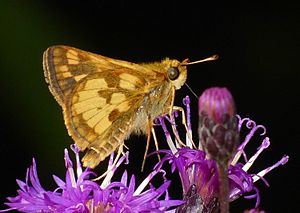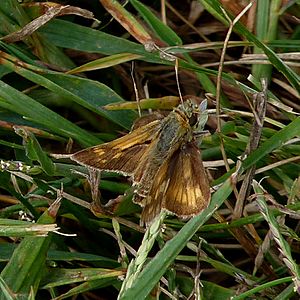Peck's skipper facts for kids
The Peck's skipper, also known as Polites peckius, is a small butterfly. It lives in North America. You can find it across Canada, from British Columbia to Labrador. In the United States, it lives in most northern and central states. This butterfly is part of the skipper family. Skippers are known for their quick, darting flight.
Quick facts for kids Peck's skipper |
|
|---|---|
 |
|
| Near Cincinnati, Ohio | |
 |
|
| Conservation status | |
| Scientific classification | |
| Kingdom: | |
| Phylum: | |
| Class: | |
| Order: | |
| Family: | |
| Genus: |
Polites
|
| Species: |
P. peckius
|
| Binomial name | |
| Polites peckius W. Kirby, 1837
|
|
What Does the Peck's Skipper Look Like?
Both male and female Peck's skippers are dark brown. They also have yellowish-orange markings. If you look at the underside of their hindwing, you will see a large, straw-colored patch. This patch helps tell them apart from other similar butterflies.
Male skippers are usually lighter in color than females. Males also have a special round or oval mark on their front wing. This mark is called a stigma. Like other skippers, the ends of their antennae have tiny hooks. The wingspan of a Peck's skipper is about 19 to 27 millimeters.
Life Cycle and Habits
Peck's skippers fly from May through October. They usually have two or three generations of butterflies each year. Adult skippers drink nectar from flowers. They like flowers such as red clover, purple vetch, and thistles.
These butterflies prefer to live in grassy areas. You can often find them in meadows, marshes, and along roadsides. After mating, the female skipper lays her eggs one by one. The caterpillars, which are the young skippers, eat plants like rice cutgrass. They probably also eat bluegrass and other types of grass.


